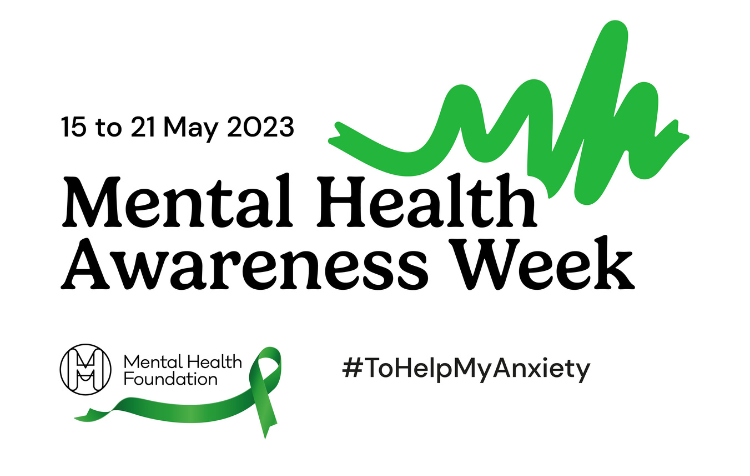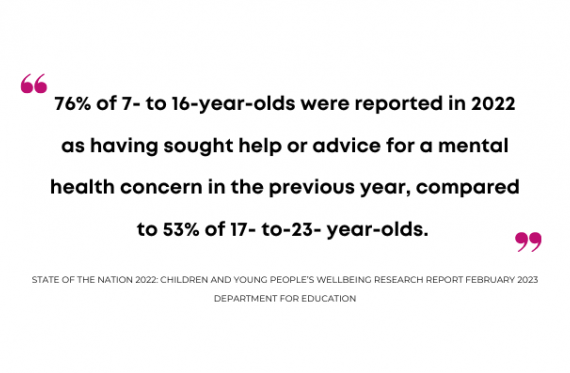.
Mental Health Awareness Week 2023 is from 15th – 21st May, and it’s the ideal opportunity to teach children about it. This year's theme is anxiety. Anxiety is a feeling they may experience when faced with tests, new situations, or big life events, and teaching children about it can help them understand their emotions better and be more considerate of others.
.
Mental Health Awareness Week 2023 is just around the corner, so read on to find out why and how you can help children begin to understand their feelings…

Mental Health Awareness Week 2023 runs between the 15th and 21st of May. This year, the theme is anxiety and how everyone experiences it, but sometimes it can be out of your control.
.
The idea is that by talking about it and raising awareness of anxiety, we can increase understanding and empathy and give people the skills to manage, no matter their anxiety levels.

According to recent research, 76% of 7 to 16-year-olds were reported in 2022 as having sought help or advice for a mental health concern. That’s an increase compared to previous years and tells us it’s an ageless issue.
Furthermore, there have been so many global events in recent years that have resulted in a uniquely tumultuous childhood for the younger generation. One that many of us adults cannot relate to as we had relatively steady experiences in comparison. They have lived through a global pandemic, ongoing wars, increased poverty, overzealous groups, racism, prejudice, and so much more. Giving them the skills to manage their feelings and cope with any mental health issues they may face makes sense in the current climate.
.
At the end of the day, we are all susceptible to mental health problems, so educating each other as early as possible is a wise move.
Children are clever. They can tell when something is wrong and when someone is feeling upset. They learn social and emotional skills throughout their younger years, which helps them understand cues and be aware of those around them, but there are things you can do to help children understand mental health more as they grow.
.
The key is to make it clear and appropriate for their age. For example, young children under seven may not understand what depression or anxiety is, but they do know what it means to be sad or worried. Similarly, teenagers could be experiencing these feelings themselves, so you should speak to them honestly and avoid condescending and disregarding their thoughts and feelings.
.
Here are some more defined ways you can teach children and teens about mental health:

Books are incredibly valuable teaching tools as they can help us explore other people, cultures, and situations. So, why not source books about mental health, such as Breathe by Karen Moncrieffe. This book is about Nicole, who keeps her anxiety a secret from everyone resulting in stressful situations.
You can also find loads of book collections about mental health which support the Statutory Guidance for Relationships Education, Relationships and Sex Education (RSE) and Health Education that came into force in 2020.

Hiding how they feel might be the go-to for many children and teens, so it’s best to create opportunities to talk and listen to each other. Try asking about their day, what is on their mind or how they are often, as this can cultivate an open and honest relationship. They may not share every time, but giving them the option can lend them the confidence to approach you later, and will let them know you’re there for them.
You can also use this time to talk about how you feel and share your thoughts. Children learn by example, so being honest and open about your experiences with mental health can help them understand more about themselves and others.

Sometimes doing something else can help you talk about your worries more easily. With things like baking, walking, and crafting, there’s something to take the focus away, keep your hands busy, and reduce concentrated eye contact, which can be intimidating and add unnecessary pressure. Here are some activities to try:

There are loads of TV shows and films about mental health, and many are for children and teens. Recommending that children and teens watch these things is a great way to help them understand how mental health affects people and the different ways people cope.
Consider these titles:
Whether you’re worried a child is suffering, if you are or you simply want to educate them on the issues and how they can manage them, teaching children and teenagers about mental health issues is never a bad thing. So be open, be clear and help them learn.
Debbie is an experienced writer with more than 11 years’ experience in the creative and writing industries. With support from companies like Badger Learning, she aims to support teachers and schools as they explore different teaching and learning opportunities to help the younger generations thrive.